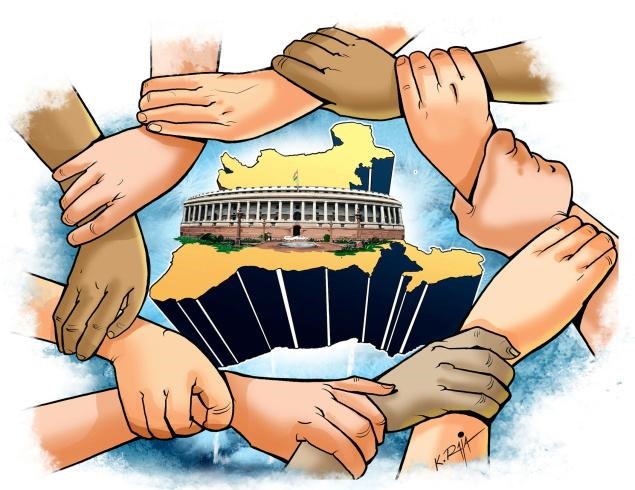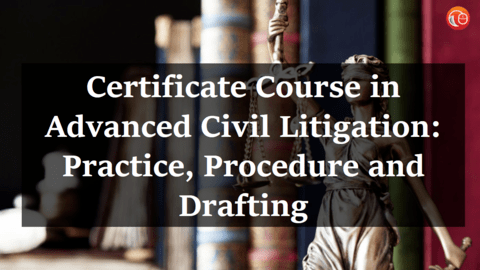This article is written by Oishika Banerji of Amity Law School, Kolkata. The article deals with a detailed discussion on the relevance of inter-state relations in the federal system of India.
Table of Contents
Introduction
India being a democratic country follows the federal system of government which signifies a two-tier government with each assigned with well-structured powers, and functions. The federal system helps in ensuring unity in diversity and achieving common national goals between the Central Government, and the State governments. Thus the federal system of government is a reflection of the harmonious relation maintained between the Centre and the states. But for the purpose of successful functioning of the federal system of the Indian government, alongside the Centre-State relationship, there comes a need to maintain cooperation between the states inter se. The Parliament of India has established zonal councils with the objective of promoting inter-state coordination such as the River Boards Act, 1956, Inter-State Water Disputes Act, 1956, and several others. Further, the Constitution of India has also recognized the relevance of such relation which has been reflected by a list of provisions enshrined under the Indian Constitution as follows;
- Adjudication of inter-state water disputes under Article 262.
- Coordination through inter-state councils under Article 263.
- Mutual recognition of public acts, records, and judicial proceedings under Article 261.
- Freedom of inter-state trade, commerce, and intercourse under Article 301.
This article discusses the relevance of inter-state relations with respect to the federal system of India.
Inter-state water disputes
The Indian Constitution has laid down the provision for inter-state water dispute under Article 262 which reads as,
“(1) Parliament may by law provide for the adjudication of any dispute or complaint with respect to the use, distribution or control of the waters of, or in, any inter-State river or river valley.
(2) Notwithstanding anything in this Constitution, Parliament may by law provide that neither the Supreme Court nor any other court shall exercise jurisdiction in respect of any such dispute or complaint as is referred to in clause ( 1 ).”
Clause (2) ensures the functioning of Clause (1) which vests the power to make law, adjudicate disputes, control issues related to water between any inter-state on the Parliament entirely restricting the judicial interference in totality. Entry 56 of the Union List vests power on the Union Government for the regulation and up-gradation of inter-state rivers and river valleys only till the extent that has been declared by Parliament taking into account public interest. The two legislations namely the River Boards Act, 1956, and the Inter-State Water Disputes Act, 1956 were enacted by the Parliament in governing inter-state water disputes. While the former statute calls for river boards to be established for the purpose of the regulation, and governance of inter-state rivers, and river valleys, the latter empowers the Central government to form an ad hoc tribunal that will adjudicate on inter-state disputes in relation to the river or river valleys. The Inter-State Water Disputes Act 1956 restrains the Supreme Court from any other court to have jurisdiction over water-related inter-state disputes as to the same completely vests on the tribunal whose decisions will be considered to be final and binding on the parties to such dispute. The Central Government at present has set up eight inter-state water dispute tribunals namely;
- Krishna Water Disputes Tribunal: Set-up in 1969 and covers the states of Maharashtra, Karnataka and Andhra Pradesh.
- Godavari Water Disputes Tribunal: This Tribunal was also set up in 1969 and has been covering the states of Maharashtra, Karnataka, Andhra Pradesh, Madhya Pradesh and Odisha.
- Narmada Water Dispute Tribunal: This Tribunal was established in 1969 for the states of Rajasthan, Madhya Pradesh, Gujarat, and Maharashtra.
- Ravi and Beas Water Disputes Tribunal: Set-up in 1986, and covers the states of Punjab, Haryana and Rajasthan.
- Cauvery Water Disputes Tribunal: This Tribunal was set up in the year 1990 for the states of Karnataka, Kerala, Tamil Nadu and Puducherry.
- Second Krishna Water Disputes Tribunal: Set-up in the year 2004 for the states of Maharashtra, Karnataka and Andhra Pradesh.
- Vansadhara Water Disputes Tribunal: This Tribunal obtained its structure in the year 2010 for the states of Odisha and Andhra Pradesh.
- Mahadayi Water Disputes Tribunal: Also set up in 2010, this Tribunal covers the states of Goa, Karnataka and Maharashtra.
Many times the Central Government legislation failed to be implemented efficiently as has been reflected in the Godavari water dispute in 1962 followed by the Cauvery water dispute in 1970. Formation of a tribunal takes time which eventually defeats the purpose behind such formation and the concerned dispute which was in hand. Such delays and possible loopholes must be addressed as has been carried out in the 2002 amendment of the Inter-State Water Dispute Act, 1956 that mandated tribunal set-up within a year when a dispute was brought to notice.
Coordination through Inter-State council
Article 263 of the Indian Constitution lays down the provision for the formation of an Inter-State Council by the President of India as the Article reads as,
“If any time it appears to the President that the public interests would be served by the establishment of a Council charged with the duty of
(a) inquiring into and advising upon disputes which may have arisen between States;
(b) investigating and discussing subjects in which some or all of the States, or the Union and one or more of the States, have a common interest; or
(c) making recommendations upon any such subject and, in particular, recommendations for the better coordination of policy and action with respect to that subject, it shall be lawful for the President by order to establish such a Council, and to define the nature of the duties to be performed by it and its organisation and procedure.”
One needs to understand that the power to set up an Inter-State Council has been vested on the President who can define the powers of the same because the Council works to coordinate not only between states but also between the Centre and the states. Clause (a), (b), and (c) of Article 263 provides the manner in which the President is supposed to assign duties to the council namely by means of enquiry, investigation, and recommendation. Formed on 28th May 1990 on the recommendation of Justice R. S. Sarkaria report of January 1988, the Inter-State Council comprises of the following members;
- The Prime Minister of India as the Chairman of the Council;
- The Chief Ministers of every State as the members of the Council;
- Chief Ministers of Union Territories having a Legislative Assembly and Administrators of UTs not having a Legislative Assembly as members of the Council;
- Six Ministers of Cabinet rank in the Union Council of Ministers to be nominated by the Prime Minister as members of the Council.
It is to be noted that the decisions of this Council are advisory in nature, and not binding like the tribunals constituted for resolving inter-state water disputes, and therefore, can deal with both legal and non-legal disputes. It is to be noted that the Council has been assisted by a secretariat known as the Inter-State Council Secretariat which came into existence in 1991 and was headed by a secretary to the Government of India. The same has been functioning as the secretariat of the Zonal Councils since 2011. The Councils which has been formed by the President for better policy coordination between various states or the Centre and the states under this constitutional provision are;
- Central Council of Health.
- Central Council of Local Government and Urban Development.
- Four Regional Councils for Sales Tax for the Northern, Eastern, Western and Southern Zones.
Followed by this, there are three Commissions that have been formed under this Council to look after its working effectivity, and power discharge, namely;
- Punchhi Commission: This was formed to look into the new issues of Centre-State relations keeping in view the dynamic nature of polity and economy of India.
- Sarkaria Commission: This was the first Commission that was formed for the purpose of reviewing the working of the existing arrangements between the Centre and the States in the changed socio-economic scenario.
- Other Commissions: Under this broad heading, there are three Commissions that are working namely;
- First Administrative Reforms Commission;
- National Commission to Review the Working of the Constitution (NCRWC);
- Second Administrative Reforms Commission.
Mutual recognition of public acts, records, and judicial proceedings
Article 261 of the Indian Constitution lays down the provision for public acts, records, and judicial proceedings which reads as,
“(1) Full faith and credit shall be given throughout the territory of India to public acts, records and judicial proceedings of the Union and of every State
(2) The manner in which and the conditions under which the acts, records and proceedings referred to in clause (1) shall be proved and the effect thereof determined shall be as provided by law made by Parliament
(3) Final judgments or orders delivered or passed by civil courts in any part of the territory of India shall be capable of execution anywhere within that territory according to law Disputes relating to Waters.”
The purpose of this provision is to erase the difficulty of recognizing acts and records of one state by the others which results because the jurisdiction of a state is confined to its territory only. The full faith and credit clause enable providing public acts, records and judicial proceedings of the Centre and every state throughout the Indian territory thereby vesting the burden of providing a manner and regulating such providence on the Parliament by means of its legislation. Another feature of this provision is that it does not mandate courts of one state to enforce the penal laws belonging to another state thereby only being concerned with civil jurisdiction.
Freedom of inter-state trade, commerce, and intercourse
Trade and commerce play a significant role in increasing coordination and harmonious relations between states. Part XIII of the Indian Constitution comprising Articles 301 to 307 lays down the provisions for freedom of inter-state trade, commerce, and intercourse. Followed by which, Article 301 specifically declares that, “Subject to the other provisions of this Part, trade, commerce and intercourse throughout the territory of India shall be free.” Thus this provision has assumed its structure in line with the fundamental right to freedom of trade and commerce incorporated under Article 19 (1)(g). It is necessary to mention that the freedom provided by Article 301 is not confined to inter-state trade, and commerce practices only but also intra-state trade, commerce, and intercourse. Therefore, with a divergent ambit, Article 301 promotes the free flow of trade, commerce, and intercourse all over the nation, and the same will be violated if restrictions are thrust upon any state’s frontier. But, Article 301 will not be infringed when restrictions existing within Articles 302 to 305 are imposed which have been listed hereunder;
- When public interest is getting affected in some way or the other, to reserve the same, reasonable restrictions on freedom of trade, commerce, and intercourse can be imposed;
- On the grounds of public interest also, the Parliament can provide certain reasonable restrictions but a bill for such circumstances has to be introduced in the legislature with the President’s sanction;
- Goods imported can be taxed by the legislature provided the same does not turn out to be discriminatory;
- The freedom provided under Article 301 of the Constitution is subjected to nationalisation laws.
In order to implement these restrictive provisions, the Parliament can appoint a competent authority but till now nothing of such sort has taken place.
Zonal councils
The States Reorganisation Act of 1956 divides India into five zones namely Northern, Central, Eastern, Western and Southern thereby providing a zonal council for each zone. Thus these Zonal Councils are statutory bodies composed of the Home Minister of the Union Government as the common Chairman, the Chief Ministers of all the States in that zone, two ministers from each state in the zone, and an administrator of each Union territory in that zone. The subject matters that are majorly taken up by the Zonal Councils for discussions include economic and social planning, disputes associated with borders, inter-state transportation, linguistic minorities, and so on. The objectives that are taken up by these Councils include;
- Promote emotional integration within the country by harmonizing one state with the other and between the Centre and the states;
- Increase cooperation between Centre and the states on social and economic concerns by means of exchanging views;
- Promotion of economic development in the states;
- Maintaining political equilibrium between different regions of the democratic nation.
Conclusion
Inter-state relations as having been discussed in this article holds immense relevance in today’s time when diplomatic relations are increasing among different nations. In order to deal with the internal issues of a nation effectively, inter-state relations need to be established effectively. Though India being a vast nation spread over 29 states and 7 union territories are facing different problems associated with different regions, maintenance of unity among the states and between the Centre and the state has been the only way to bringing about logical solutions to such problems.
References
- https://nios.ac.in/media/documents/srsec317newE/317EL8.pdf
- https://www.orfonline.org/research/the-paradox-of-centralised-federalism/
- https://www.thehindubusinessline.com/opinion/reinventing-indias-federal-system/article32725077.ece
- https://pdpu.ac.in/cce/downloads/Inter-State%20Relations.pdf
Students of Lawsikho courses regularly produce writing assignments and work on practical exercises as a part of their coursework and develop themselves in real-life practical skills.
LawSikho has created a telegram group for exchanging legal knowledge, referrals, and various opportunities. You can click on this link and join:
https://t.me/joinchat/J_0YrBa4IBSHdpuTfQO_sA
Follow us on Instagram and subscribe to our YouTube channel for more amazing legal content.
 Serato DJ Crack 2025Serato DJ PRO Crack
Serato DJ Crack 2025Serato DJ PRO Crack











 Allow notifications
Allow notifications


